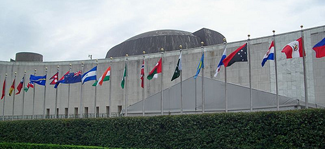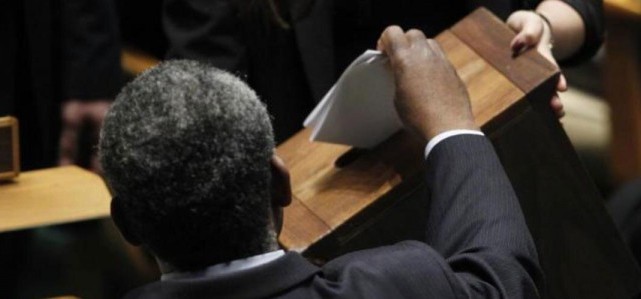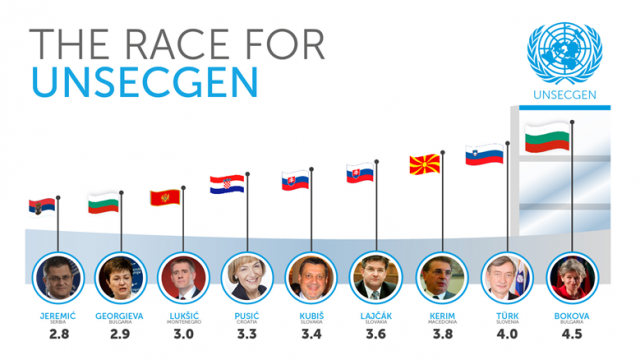The UN General Assembly convened yesterday for a long-overdue discussion on specific reforms in selecting the UN Secretary General. The body has frequently met to discuss “revitalization” of its role in the process, but until this year has not engaged on specific proposals that have been urged by civil society for over the last decade.
The Rules of the Game
The UN Charter provides a rather uncomplicated process for electing the organization’s top officer – appointment by the General Assembly upon nomination of the Security Council. There is no mention of the veto, term of office or other criteria that have received criticism in recent years. Those provisions arise instead from procedural rules or accepted practices that have been adopted over time. (A list of these can be found here, mostly unchanged since Ban Ki Moon’s selection in 2006.)
 The most fundamental provisions were defined in a UN General Assembly resolution adopted in 1946. Among other rules, the resolution provides that the Security Council put forward a single nominee for the General Assembly’s consideration. This restriction was intended to avoid debate in the General Assembly and ensure the nominee entered into office with broad, global support. But the Assembly has in recent years viewed this as a restriction on its ability to choose from among several qualified candidates.
The most fundamental provisions were defined in a UN General Assembly resolution adopted in 1946. Among other rules, the resolution provides that the Security Council put forward a single nominee for the General Assembly’s consideration. This restriction was intended to avoid debate in the General Assembly and ensure the nominee entered into office with broad, global support. But the Assembly has in recent years viewed this as a restriction on its ability to choose from among several qualified candidates.
Governments staking out positions
In contrast to the 2006 race, Asian states appear to be aligning behind the call for multiple nominees to be presented to the General Assembly when the next UN Secretary General is chosen in 2016. India, Indonesia and Malaysia all expressed this position during yesterday’s closed General Assembly forum on the process. India suggested further that the Assembly should elect the post by a 2/3rds majority vote, which would require revising the simple majority requirement in the 1946 resolution. (India has called for multiple candidates and a strong UNGA role since 2006.)
Indonesia proposed another significant revision, suggesting that the nomination from the Security Council not be subject to the veto of a permanent member. Both it and Malaysia called for greater dialogue between the General Assembly and the Security Council. Malaysia called for a joint letter on the process to be issued by the President of the Security Council and President of the General Assembly. (Malaysia will serve as President of the Council in June 2015 and July 2016.)
China and Japan both called for greater fidelity to the Charter, preferring to avoid changes to the 1946 resolution. China is likely very skeptical of a more open process which could weaken its role as a permanent member. Japan, also desirous of a permanent seat, encouraged a more structured process in line with the Charter, but kept its support for any actual reform very non-committal.
Others are likewise worried about a process that could limit their role in selecting the Secretary General. In opposing a deadline for nominations, the United States couched its position as providing for nominations for the “best Secretary General” to come in even at the last minute. This position was hardly defensible in 2006, let alone today:
Deadlines serve as one accountability mechanism against a politicization of the process that would otherwise encourage “dark horse” candidacies. Such candidates are individuals whom governments may privately support from the beginning but not formally nominate until later in the process, usually after strategically voting against announced candidates. Such nominees usually unknown (as candidates) to the majority of governments, but become “compromise” candidates after others are eliminated from consideration.
The United States further commented that it was “open” to some new ideas (how kind of them!) as long as the process remained within the “current framework” – referring of course to the 1946 resolution. This would ensure it maintained a veto over the eventual nominee and that only a single nominee would be put forward to the General Assembly.
France joined China and the U.S. in preferring to keep any discussion limited to the vague provisions of the Charter. The process should not “divide states,” the representative stated, clearly opposing revisions to the 1946 framework that would allow for states to consider multiple nominees.
Other states countered this view strongly. Finland noted that the role of the Security Council was important, but that security was only one pillar of the United Nations and that other interests required that all states share equal ownership in the selection of its top officer. The strongest opposition however came from the Latin American and Caribbean states. Colombia, Costa Rica and Guatemala all challenged the permanent members’ opposition to allowing multiple nominees. Cuba chastised the Assembly for lacking the political will to implement changes to the 1946 rules, suggesting the body’s failure to act left the selection a “private matter” in the hands of the Security Council. Brazil called for reforms to be adopted immediately; otherwise it would be at least 5 more years before it would be possible.
Costa Rica was the most outspoken on the need to update the process, calling the selection the “most important decision in 2016. [The] int’l community can & must get involved in the process,” and using the hashtag #FindtheBestUNLeader. The GRULAC member contributed significantly to a the regional CELAC document introduced by Ecuador as well as the consensus proposals from the Accountability, Coherence and Transparency group of small states. Costa Rica itself supports several significant reforms, including a single 7 year term, female nominees, public hearings, and nomination deadlines. Whether GRULAC’s representatives on the Security Council – Venezuela and Chile – will push the CELAC proposals or support Costa Rica’s position is to be seen.
@tonyfleming that’s a question for them!
— Maritza Chan (@MaritzaChanV) April 27, 2015
(How such reforms can drastically impact selection processes was examined immediately following the 2006 UNSG race in this paper.)
Calls to select the first woman Secretary General were widely supported by many states, with the exception of Russia. For a world power, the country has taken to making almost laughably absurd comments. In responding to calls for female nominees, its (male) representative suggested that the effort would amount to “discrimination” against male candidates. In contrast, states from GRULAC, Eastern and Western Europe stated their firm support in for gender equality in the selection.
Hungary and Moldova reiterated the regional call for the post rotating to Eastern Europe this round, and Germany endorsed the emerging consensus. While supporting other proposals as “not radical… they complement the existing process, not upend it,” Canada downplayed geographic diversity, describing it as “a valued principle that should inform, but not determine outcomes.” No other states made a point of supporting regional rotation, though any challenge to it is unlikely at this stage.
The Next Steps
Discussions on the process will now unfold in a “hurry up and wait” approach over several months.
We will see greater dialogue between the President of the Security Council and the President of the General Assembly, but a joint letter outlining the process as urged by Malaysia is not likely to emerge until next year. Formal letters of nominations will be deposited with the President of the Security Council following the opening of the 70th General Assembly session in September, but agreement on the process will likely await new Security Council members being seated in January. (At that time, Venezuela will serve as Council president and we’ll see if it pushes the CELAC proposals.)
In the meantime, civil society groups such as @1for7billions, UNElections.org, @She4SG and others will be working with governments on building support for a more open and transparent process. Follow @Global_Memo for continued updates from multiple sources.
Many thanks to Natalie Samarasinghe, Bonian Golmohammadi and Pass Blue for their coverage of the Assembly’s debate.






One thought on “General Assembly members push UNSG selection reform”
Comments are closed.